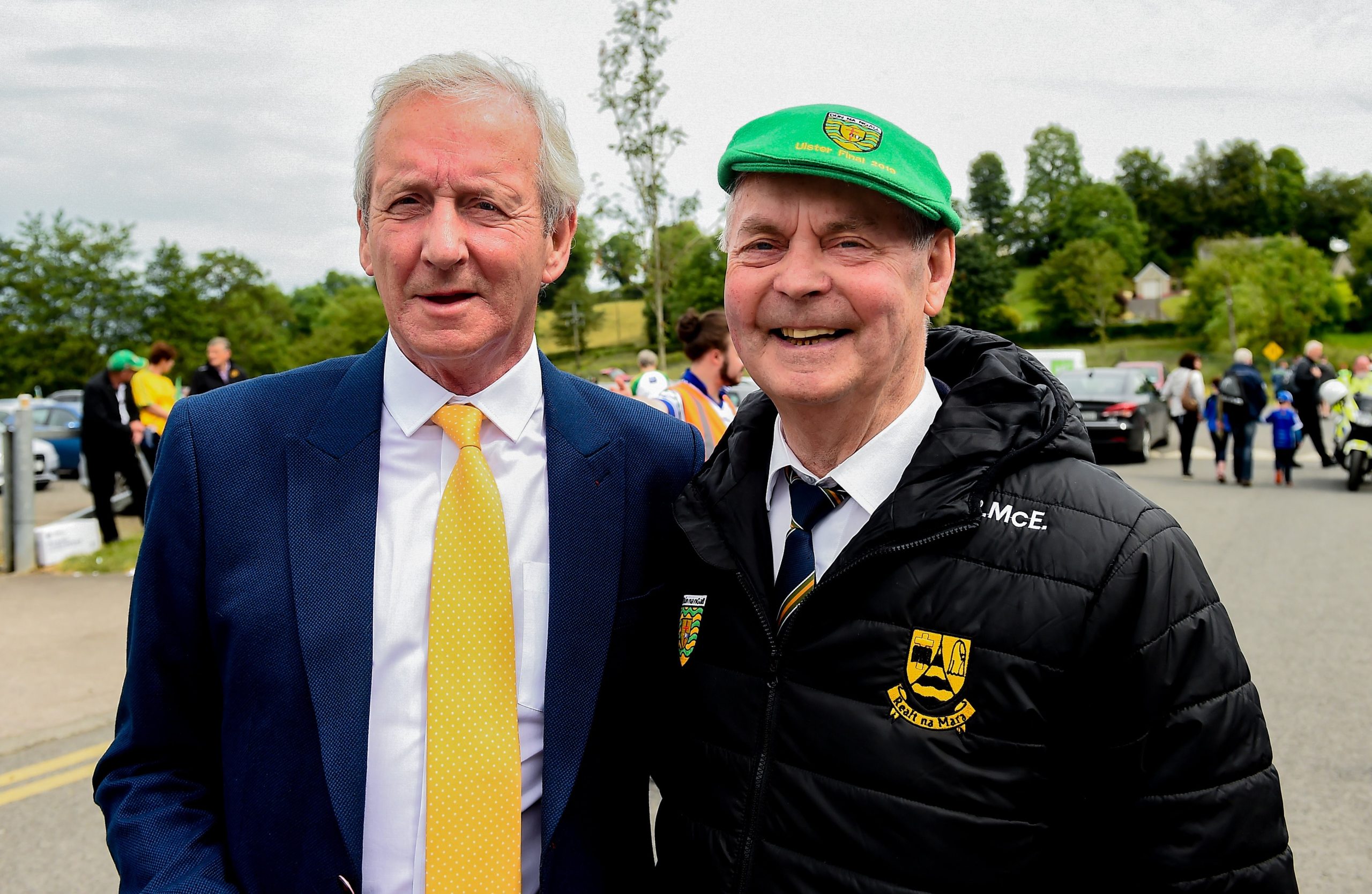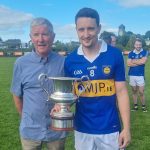By Niall Gartland
FOR more than four decades, the now-defunct St Joseph’s club stood proudly as the only Donegal team ever to have got their hands on the Ulster Senior Club Championship title.
An amalgamation of Ballyshannon and nearby Bundoran, they surged to provincial glory in 1975 overcoming Castleblayney in the final after a replay. Other Donegal teams came and went, but it took until 2018 before another repeated the trick, Gaoth Dobhair seeing off another Monaghan side – Scotstown – on Ulster final day.
Winning an Ulster Senior Club title is a seismic accomplishment, but dig a little deeper and the St Joseph’s story is far more interesting than it first appears.
They won two unofficial Ulster titles in 1966 and 1967 before the competition was officially inaugurated in 1968, two title triumphs which don’t appear in the roll of honour list but certainly aren’t forgotten about by those involved.
They even won an unofficial All-Ireland title in 1968 against a Dunmore MacHales team containing so many of the Galway All-Ireland winning stars of that era. It was played over two legs, their first encounter described by the late Sean Curran of the Derry People as the greatest Gaelic football match he had ever watched.
Their player with the most name recognition was Brian McEniff, a man at the coalface of Donegal football for many decades. He led the county as player-manager to their first ever Ulster title in 1972 and playing that day at full-back was another St Joseph’s star, Pauric McShea.
Like Brian, Pauric’s mother hailed from county Tyrone (Brian’s from Carrickmore; Pauric’s from neighbouring Errigal Ciaran). He was also part of McEniff’s backroom team when Donegal brought Sam back to the Hills in 1992.
Only for the amalgamation of Ballyshannon and Bundoran in the early-sixties, they mightn’t have ended up quite so close to each other.
Owen Roe O’Neill, a legendary Ballyshannon Gael who passed away earlier this month, brought his diplomacy skills to bear in persuading the doubters on either side of the dividing line.
McShea commented: “When it came to the politics of the two clubs coming together, there would have been a degree of resistance from some of the more senior officials involved.
“Owen Roe, God rest him, was one of the main instigators in the two clubs coming together. I’d give him great credit for having the foresight and courage to see it through despite a lot of criticism at the time.”
On the rationale between the link-up, he said: “I think the main reason was to try to enhance the quality of football within the county. I think it served a purpose and I have to say I don’t think it’s beyond the realms of possibility that there’s a lot more amalgamations in the future given the amount of emigration and lack of employment opportunities in rural Ireland.”
“There were two games home and away. The first was in Bundoran and the second was in Tuam. The Dunmore team that we beat had five of the Galway three-in-a-row team playing for them – John and Pat Donnellan, John and Tommy Keenan and Seamus Leyden.
“St Joseph’s and Dunmore were winning county championships for fun at that stage. Both played a nice brand of football I have to say – it wasn’t anything like the stuff we watched in recent years, it was all-out attacking football.”
McShea also fervently believes that St Joseph’s success on the club front paved the way for Donegal’s first-ever Ulster Championship success in 1972.
He believes that the county harboured an inferiority complex before their maiden provincial success, but that wasn’t a problem with their St Joseph’s contingent, accustomed to success outside the confines of the county.
“Donegal played Down in an Ulster final in Casement Park in 1966 and in those days the colour of the Down jersey alone was enough to beat Donegal.
“When St Joseph’s started running county titles, five or six of us went into the Donegal team at a time when we had a very bad record in Ulster football.
“There seemed to be an inherent fear about winning, there was a real confidence deficit and a situation arose where a number of the players felt we had no right to be playing against the likes of Down, Cavan or even Derry.
“The fact we were successful at club level and won that All-Ireland did breed a confidence. I went out to San Francisco in 1973, we played Cork who were the All-Ireland champions and the full-back line was Donie O’Sullivan, myself and John O’Keefe. Paddy Cullen was our goalkeeper, Frank McGuigan was in the middle, Peter McGinnity and Sean O’Neill were playing.
“They were extremely experienced and talented footballers but the one thing I discovered out there was that while they were good footballers all of them had only two arms and legs.”
Another factor in Donegal’s long-awaited Ulster triumph was that the St Joseph’s players had what McShea describes as a telepathic connection with one another.
“We were in nucleus of the Donegal team, and I don’t mean to sound arrogant but there was a bit of a telepathy with the St Joseph’s players.
“I was back at full-back and I was taking the kick-outs because the goalkeeper didn’t take them. Nine times out of 10 I’d find Brian [McEniff] because we’d such a strong connection – he’d make himself available and I was reasonably accurate and then off he’d go. I do think that St Joseph’s influence was a big factor in Donegal’s success and I know that sounds parochial. It certainly was a help anyway.”
Another key factor was the managerial ability of his clubmate McEniff, whose modernised approach aligned with his powers to motivate made him one of Ulster’s greatest in that regard.
“The one thing Brian installed in Donegal was a self-belief. I’d be quite critical of Donegal’s management before Brian came in. In the 1966 Ulster final I was played out of position at left-corner forward, Brian was an unused sub and they played three lads who were clearly injured. It seemed like their main brief was to get as many guys on the pitch from their own club – it was a national malaise at the time but it was wrong.
“I was felt Donegal had a lot of very good teams in the sixties and early seventies that never won an Ulster title and I’d put that down to poor administration.
“Thankfully that changed when Brian came in, and his greatest ability as a manager was to make players believe that they were maybe even better than they actually were, and there’s an art in that.”
“He worked us very hard – I remember he brought in Mick Higgins who had played in the Polo Grounds for Cavan when they beat Kerry in the 1947 All-Ireland final. Mick came in as an advisor and he was an absolute gentleman and very helpful, so that was an inspired choice as well.”
On the club front, St Joseph’s claimed their one and only official Ulster Championship title in 1975, overcoming Castleblayney after a replay. The big hitters in their heyday were Bellaghy, Bryansford and Clan na Gael, but McShea recalls that they always had particular difficulties with a Fermanagh club.
“We played a lot in the Ulster Club and it was a great competition but one of the teams that always gave us a right bit of difficulty were a wee Fermanagh team called Devenish. They had PT Treacy, his brother JJ and a big fella Tommy Gallagher and they were very good footballers. I always got the impression down the years that Fermanagh teams always raised their game against Donegal, we rarely seemed to get it easy against them.”
The St Joseph’s story came to an end following a County Convention in 1978. Glenfin, Na Rossa and Dunkineely proposed that no amalgamations be allowed in championship football and the motion was carried, but there’s no hard feelings of McShea’s part.
“I do think St Joseph’s would’ve stayed if both clubs had been keen enough. A lot of us were coming close to the end of our playing careers anyway, I’d been at it since I was 16 with Donegal and I was building a house. There were different priorities that descended on a lot of us around that time. To be fair to the other clubs in the county, while they might have had a bit of an issue with us being the dominant force within the county, I think the conclusion came to more or less a natural end anyway because of circumstances.”
And one more question for the road. Does it rankle that St Joseph’s various successes in Ulster and beyond during the 1960s aren’t officially recognised by the GAA? McShea says that isn’t the right way of looking at it.
“It doesn’t annoy me because if you asked me what did I enjoy most about playing, I’ve three sisters and no brothers. My father had me in Croke Park when I was four as a mascot for the Ulster team in the Railway Cup. My mother, no more than my dad, loved going to the matches.
“The real satisfaction I got was seeing them enjoy themselves. The year I got to San Francisco with the All-Stars, the first two on the plane were my mother and my father. When I wasn’t selected the following two years, the first two people on the plane were still my mother and my father, because they enjoyed it so much! I made life-long friends with the guys I played football with.
“Unfortunately some have gone to their eternal reward but the bond and the friendships that you make I think is unique to Gaelic football,” he added.
Receive quality journalism wherever you are, on any device. Keep up to date from the comfort of your own home with a digital subscription.
Any time | Any place | Anywhere















